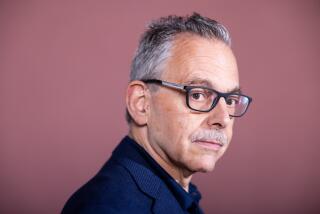Muslim Activist Seen as Voice of Moderation, Reason for Community : Religion: Director of Muslim Public Affairs Council responds to misperceptions of Islam and tries to draw others into mainstream of U.S. political life.
- Share via
On Thursday, he held a news conference in Los Angeles with a prominent local Muslim leader to praise NATO bombing attacks in defense of Muslim-sheltering “safe zones” in Bosnia.
In Dallas six days earlier, he announced a national campaign to support a Muslim couple who lost their two young children to state-ordered adoption that led to baptism as Christians by the foster parents.
On the day of the Oklahoma City bombing, as first reports mistakenly discussed Middle Eastern suspects, he helped Muslim leaders in that city write news releases urging caution and expressing dismay. Days later, he organized a meeting in the Oklahoma governor’s office--the first-ever between Oklahoma authorities and local Muslims.
For a man only 35, Salam Al-Marayati of Glendale has built a national reputation as a Muslim activist.
Born in Baghdad but raised in California, Al-Marayati, director of the Los Angeles-based Muslim Public Affairs Council, has become a well-received voice, responding rapidly to public misperceptions of Islam and trying to draw fellow Muslims into the mainstream of American political life. Al-Marayati has also earned respect for working with other religious and political groups.
Rabbi Harvey Fields of the 2,400-family Wilshire Boulevard Temple praised Al-Marayati’s work as co-chairman of Interfaith Coalition to Heal L.A., a post Fields previously held.
“Salam presents the views of the Islamic community honestly and forthrightly,” Fields said, “but he also has been a voice of reason and moderation--moving to keep partnerships together rather than drive wedges between them, including relations between the Jewish and Muslim communities.”
The Muslim Public Affairs Council is unconventional in challenging Islamic leaders or organizations in America that maintain old-country views of the United States as totally unfriendly to Muslims and the practice of Islam, said Aslam Abdullah of Los Angeles, one of the council’s nine board members.
“We challenge the dominant Muslim assumption that the West is always the enemy and against Islam,” said Abdullah, who is editor in chief of the Minaret, the largest national Muslim magazine with a circulation of 12,000. “We want to be a part of [American] society rather than take an isolationist approach.”
Al-Marayati, a U.S. citizen, said that the Muslim Public Affairs Council does not represent Middle East governments or their political agendas.
“We don’t take money from any government--it comes purely from residents in the United States and we meet the standards of American political organizations,” he said.
Al-Marayati was a member of the Democratic National Committee at the party’s 1988 convention and was on the platform committee at the 1992 Democratic convention. He was recently appointed to the executive committee of the California Democratic Party.
But despite his many official ties to President Clinton’s party, Al-Marayati’s council bought ads in the Washington Post and New York Times this summer that accused Clinton of allowing genocide to proceed in Bosnia against embattled Muslims there.
“Principles transcend partisanship,” Al-Marayati said.
Islam in America is made up of many autonomous mosques and associations with no official clergy or central authority. Al-Marayati’s council is but one of a number of groups that tries to correct what they regard as distorted images of Islam, lobby politicians and issue statements on Muslim views.
Al-Marayati was an unlikely candidate for prominence in Muslim public affairs. He studied to be a chemical engineer at UCLA and worked for two years at a company in Irvine. But after working in 1986 and 1987 as a volunteer public relations director for the Islamic Center of Southern California, he was asked to direct a newly created public affairs council.
“My friends and family were skeptical about this career change,” he said. “Most people thought it was a job for someone older and wiser, not someone in their 20s.”
That view in the Muslim community continued until, in one short stretch of time, Al-Marayati arranged for civil rights leader Jesse Jackson to speak at the Islamic Center with C-SPAN coverage, co-authored a newspaper article on Palestinian human rights and staged a well-attended dinner honoring Times editorial cartoonist Paul Conrad in Los Angeles.
Al-Marayati’s wife, Laila, an obstetrician-gynecologist, is active in leading the council-related Muslim Women’s League. She left Friday for the international women’s conference in Beijing as a private sector adviser for the State Department and liaison between the U.S. delegation and Muslim countries.
Salam Al-Marayati passed up this weekend’s annual Islamic Society of North America convention in Columbus, Ohio, because one of the two parents has to stay home to care for their boys, ages 1 and 3.
“We are like a tag team,” he said. “One goes somewhere and the other takes the reins at home.”
More to Read
Get the L.A. Times Politics newsletter
Deeply reported insights into legislation, politics and policy from Sacramento, Washington and beyond. In your inbox twice per week.
You may occasionally receive promotional content from the Los Angeles Times.









